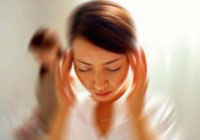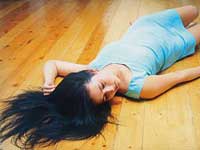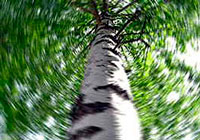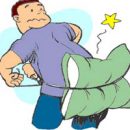Causes of dizziness, varieties, emergence mechanisms. Vestibular analyzer and its pathology.
Content

Dizziness — The sensation is imaginary
rectilinear or circular motion of surrounding items or own
Body. It occurs when disrupting the interaction of two analyzers: visual
and vestibular, as well as deep sensitivity. Before talking about the reasons for dizziness, turn to its varieties.
Types of dizziness
- systemic (true);
- Non-system.
System dizziness — Feeling
Rotation of objects or own bodies in a certain direction. Often
accompanied by nausea, vomiting, sweating, decrease in hearing and violation
Equilibrium.
Unisexual dizziness — Feeling
Falling, instabilities of surrounding items or own bodies.
-
Pre-corrupt
condition — Evrunoma in combination with vegetative disorders:
Pallor, heartbeat, nausea, darkening in the eyes; -
violation
Equilibrium — instability when walking; -
psychogenic
dizziness — Heaviness in the head, the condition is similar toxication; -
Cervicogenic
dizziness — arises due to pathological impulses from
receptors determining the position of the head relative to the body is observed
Mostly when turning heads.
Causes of dizziness of various types
True (system) dizziness is associated with
pathology of the peripheral or central departments of the vestibular analyzer.
Meniery's disease — dizziness,
accompanied by nausea, vomiting, noise in one ear, decline in hearing. During
An attack is difficult to maintain balance when walking, sit and lie. In many
Nistagm is observed by patients. The progression of the disease gradually leads to
irreversible reduction in hearing.
Labyrinthitis — Inflammation of internal
Ear. It has similar symptoms, however, they are observed constantly and decrease
Slowly when subscribing the process.
Benign Public Paroxysmal
dizziness — occurs with the rapid change of the position of the head,
lasts no more than a minute. The cause of dizziness is salting deposition
Calcium in the receptor zone of the labyrinth.
Post traumatic dizziness — develops
Immediately after injury, it is associated with the shutdown of one of the labyrinths due to
fractures of bone structures, gap membranes.
Barotravma — Spontaneous episodes
Dizziness associated with the discontinuity of the membrane of a round or oval window
(for example, with a strong cough).
Lesion vestibular (auditory) nerve — in combination with
Labyrinthitis is observed at intoxication by some drugs
means.
The cause of dizziness can also be neurith,
Nevnoma of a bridge corner. In all these cases, there is a violation
hearing.
Beaming brain — most often
associated with an acute circulatory disorder (stroke) in the brain barrel,
cerebellum, tumors in the rear cranial fossa. Accompanied by other neurological violations
(Violation of speech, swallowing, bias in the eyes).
Dizziness can be observed as part of Aura
Patients with epilepsy if temporal bark departments are involved in epileptic hearth
brain.
Spectrum of the causes of dizziness of a non-systemic nature
Also quite wide.
Pre-perspective condition can develop when
Diseases of the cardiovascular system (rhythm disorders, aortic stenosis),
hypotension, anemia. Violation of equilibrium — With organic
damage to the nervous system, in particular cerebellum.
Psychogenic dizziness accompanies depressive
disorders. Cervician dizziness — Consequence of injury
The cervical spine, sponddilee.
In order to correctly determine the cause
dizziness, it is necessary to figure out his appearance of sensations than
accompanied by what diseases and injuries are present in history.









